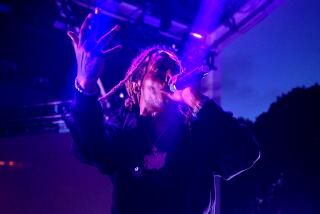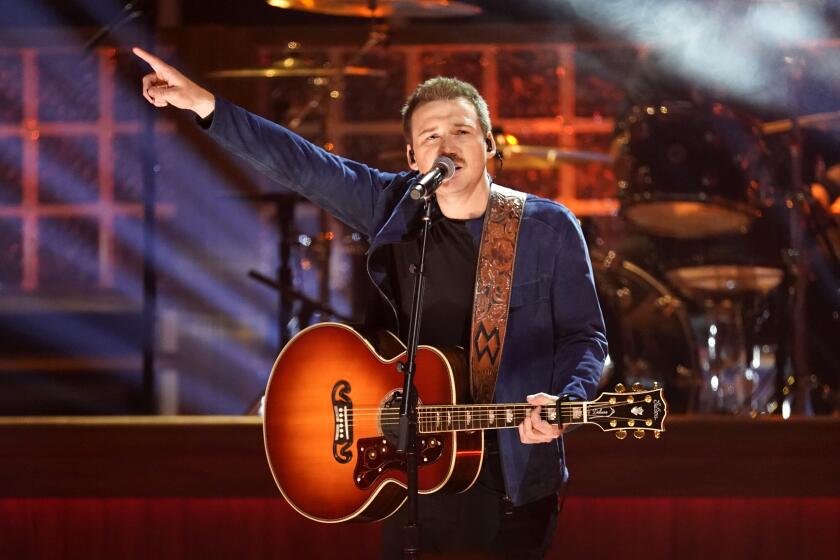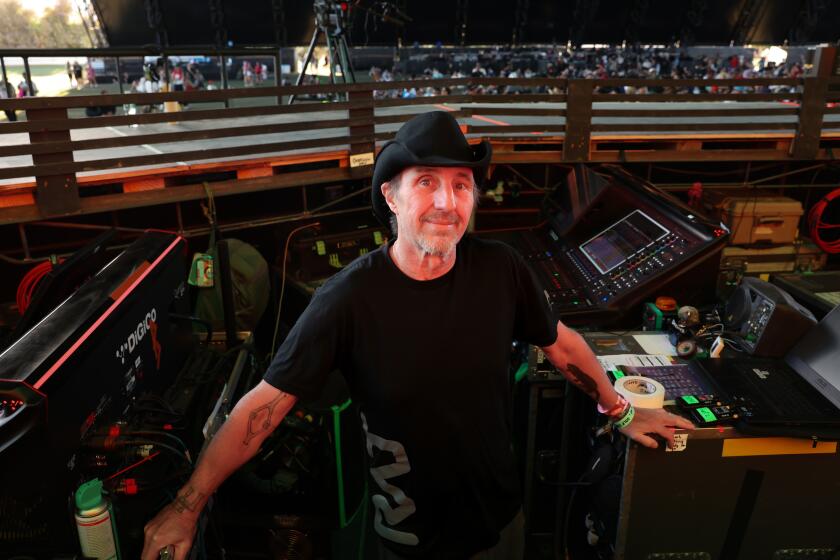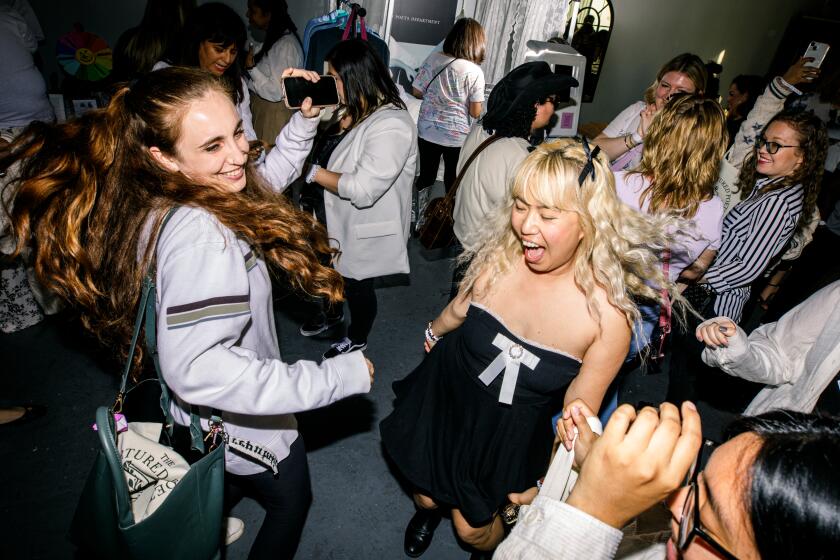The earthly days of ‘Astral Weeks’
If necessity is the mother of invention, it might follow that desperation is the father of inspiration. That was certainly the case 40 years ago, when Belfast-bred blue-eyed soul singer Van Morrison found himself broke and stranded on the East Coast despite coming off his first hit as a solo artist, the Top 10 single “Brown Eyed Girl.”
“I call that ‘The Money Song’ -- because they got all the money, and I got none,” Morrison, 63, told The Times recently from his home in Northern Ireland in a rare interview. “I was broke and depressed and remained that way for many years after that, and I just decided to make a stand for myself and do things my way, not theirs.”
The result of doing things his way was “Astral Weeks,” Morrison’s widely revered 1968 release. Four decades later it is regularly cited as one of the greatest albums of the rock era, though it never sold enough copies to show up on Billboard’s Top 200 Albums chart.
So, despite the awe the album inspired among music aficionados for its remarkable depth -- Morrison was only 22 when he made it -- he was never able to go on tour and play the songs live the way he wanted. He’ll realize that long-standing wish on Friday and next Saturday when he performs “Astral Weeks” live in its entirety over two nights at the Hollywood Bowl backed by an orchestra and two of the key musicians, bassist Richard Davis and guitarist Jay Berliner, who accompanied him so many years ago.
“I am not ‘revisiting’ it really, as this is a totally different project,” Morrison said, responding by e-mail so he could consider each question put to him. “I had always wanted to do these songs fully orchestrated and live, [but] I never got around to it. Then I thought, well, we have lost the great [drummer] Connie Kay already and Larry Fallon the original arranger, so I thought I should probably get to it now.”
He plans to record the Bowl concerts and release them on his own label on vinyl, CD and DVD around the first of the year. Despite its vast size, seating almost 18,000 -- he’s usually played indoor theaters with anywhere from 2,000 to 6,000 seats on recent U.S. tours -- the Bowl appealed to Morrison for this event “because it is outdoors and live sound dynamics can be interesting outdoors in the cool fall breeze. And the Hollywood Bowl has a lot of interesting history.”
KCRW-FM (89.9) will have its inaugural international live webcast from Friday’s show, the first time Morrison has ever allowed one of his shows to be broadcast live.
“They are timeless works that were from another sort of place -- not what is at all obvious,” he said of the songs on “Astral Weeks.” “They are poetry and mythical musings channeled from my imagination. The songs are poetic stories, so the meaning is the same as always -- timeless and unchanging. The songs are works of fiction that will inherently have a different meaning for different people. People take from it whatever their disposition to take from it is.”
In the intervening years, Morrison crafted an astoundingly rich body of work. It encompasses some of the catchiest singles of the rock era (“Moondance,” “Domino,” “Wild Night,” “Jackie Wilson Said,” “Bright Side of the Road”) as well as some of its deepest musical and spiritual pilgrimages (“Listen to the Lion,” “In the Garden,” “When Will I Ever Learn to Live in God”). Like Bob Dylan, he’s periodically delved into the various strains that have most influenced him: British skiffle, American country music, blues and jazz. Inevitably he finds his way back to his signature amalgam of soul, rock, R&B; and Celtic folk.
--
A seminal album
“Astral Weeks” revealed further-flung connections with the free-form song structures of medieval balladry and postwar jazz. In fact, it is one of the earliest albums from a rock-era musician to draw on jazz in a big way. The arrangements featured earthy upright bass, yearning fiddle, gentle flute, colorfulpercolating harpsichord and insistent acoustic guitar, with occasional overdubbed string and horn accents. Morrison’s youthfully pliant, athletic voice could have induced a pang of jealousy in Ray Charles.
With him in that studio were Davis, already a repeat winner of Downbeat magazine’s jazz bassist of the year title, Modern Jazz Quartet drummer Kay (who played on many of Charles’ recordings in the 1950s) and guitarist Berliner, one of Charles Mingus’ associates. Impressive company for a musician most fans knew only as the voice of British Invasion band Them (“Here Comes the Night,” “Gloria”).
“I think I have probably always been more advanced in my head, in my thinking” Morrison responded. “My thinking musically has always been more advanced. It is difficult to get it down onto paper sometimes, even now. The music on ‘Astral Weeks’ required these great musicians because no one else could have pulled it off like they did. They were the ones I insisted on.”
That was a tall order for Morrison, who had watched the profits from his Top 10 breakthrough wind up in the pockets of others, chief among them , who signed Morrison to his New York-based Bang Records label after having produced many of Them’s recordings.
Bang released “Brown Eyed Girl” and followed it with a collection of other recordings Morrison had done in 1967 as the album “Blowin’ Your Mind,” which was released without Morrison’s input or approval shortly before Berns died of a heart attack that year.
“I was living on a shoestring -- a very hand-to-mouth existence at that time in Boston and for a long time after that too. I went down to New York and this is when I got the offer from Warner Bros. They had told me they had to buy out the Bang deal, then I got involved with [producer Lewis] Merenstein, et al. The real reason I made ‘Astral Weeks’ recordings in New York is because I was literally broke and they kept me stranded there.”
He’d been doing club gigs in and around Boston working on new material, much of which would coalesce into “Astral Weeks.” Some of what he recorded at Bang was similarly expansive but with more of an electrified blues-rock tinge -- tracks such as “T.B. Sheets,” inspired by the recent death of a friend, and an early version of “Madame George,” which became one of the centerpieces of “Astral Weeks.”
--
Industry anomaly
Morrison has used his songs periodically to rail against the bottom-line thinking in the music industry.
“For the record business to win and win big,” he said, “it has to have people within it that have ears for music and who understand the old greats and respect [them]. With the way things have gone, it looks more and more like there is not much of a chance for new men with ears to emerge in the music business -- it’s too money-driven.”
He cited Atlantic Records co-founder Ahmet Ertegun as the model old-school music executive who “knew the value of respecting true ability and those who are there for the long haul. Today record companies are run by 30-year-olds who are more into who ‘famous’ came in the building. They don’t care about selling hard-copy CDs, where their real long-term money is.”
That’s a point of special pride for Morrison, who bucks the prevailing wisdom that the future of the record business is in downloads. Despite little or no radio airplay or record company promotion in recent times, Morrison’s current and catalog albums still sell solidly: more than 500,000 physical CDs in the last year in the U.S., according to Nielsen SoundScan, and nearly 2 million worldwide.
“I am lucky I have an audience that is not into the fad of the download,” he said. “My fans must intrinsically understand the value of having a record in their hand. With so much standing to kill the record business . . . I think it is great there are still people who appreciate the beauty of a record -- a real record, not a purchase of bad quality air through a wire that can erase with the punch of a button.”
Morrison has been famously combative in the service of his inner musical vision, and the result is that it’s hard to find anything in his extensive catalog betraying any sign of artistic compromise. But that doesn’t mean he never looks back and thinks, “What if?”
“I would have loved for Miles Davis to have played on a record of mine,” he said. “Actually, he said he would, but I didn’t get to him in time. I would have loved to have played with Howlin’ Wolf, Leadbelly, Lightnin’ [Hopkins], Mahalia Jackson, Ella [Fitzgerald], Billie Holiday, so many.”
And despite possessing one of the most expressive voices of the modern era, he connects with the sentiment of another contemporary music icon, B.B. King, who said recently, “If I could sing like Bobby Bland I’d be a happy man.”
“I only am what I am,” Morrison said. “But I sure do like the timbre of John Lee [Hooker]. And I wouldn’t mind if I sounded like Leadbelly.”
--
--
Van Morrison
Where: Hollywood Bowl, 2301 N. Highland Ave., Hollywood
When: 8 p.m. Friday and Nov. 8
Price: $75 to $350
Contact: (213) 480-3232. (Ticketmaster)
More to Read
The biggest entertainment stories
Get our big stories about Hollywood, film, television, music, arts, culture and more right in your inbox as soon as they publish.
You may occasionally receive promotional content from the Los Angeles Times.





